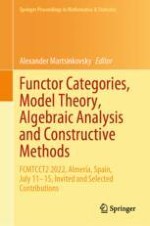This volume comprises selected contributions by the participants of the second "Functor Categories, Model Theory, Algebraic Analysis and Constructive Methods" conference, which took place at the University of Almería, Spain, in July 2022.
The conference was devoted to several seemingly unrelated fields: functor categories, model theory of modules, algebraic analysis (including linear control systems), and constructive category theory, to mention just a few. The fact that these fields are actually related is a very recent realization. The connections between these disciplines are changing in real time, and the goal of this volume is to provide an initial reference point for this emerging interdisciplinary field.
Besides research articles, the volume includes two extended lectures: one on constructive methods in algebraic analysis and the other on the functorial approach to algebraic systems theory. Hence, in addition to its interestfor researchers, the volume will also be an invaluable resource for newcomers.
